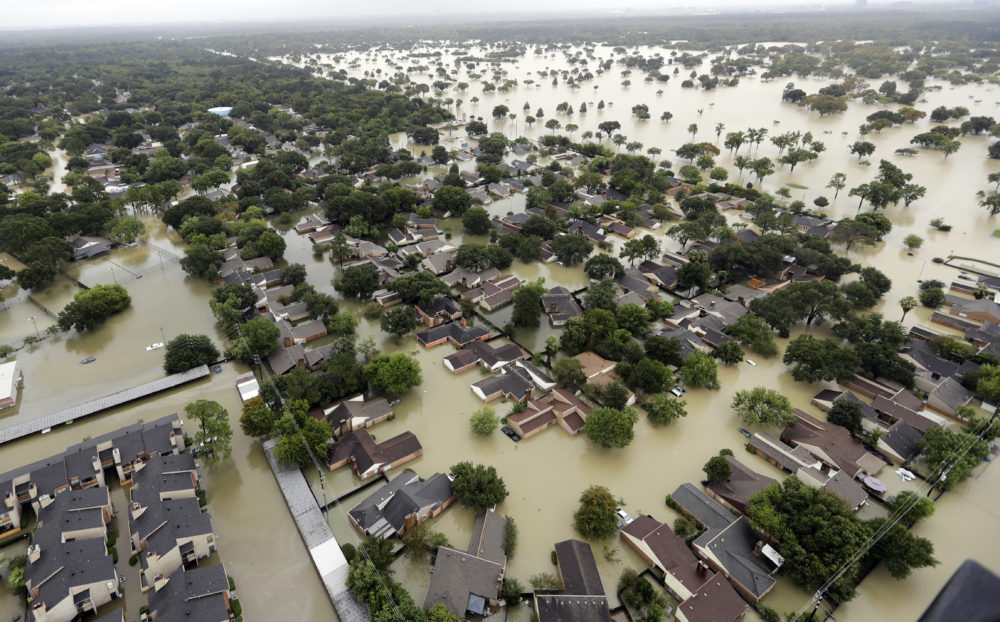
Starting this month, Texas renters will see something new before signing a lease: For the first time, landlords are required to give prospective tenants some information about a property’s flood risk.
The new law applies to all rental properties, regardless of whether they’re located in a mapped floodplain.
But some housing experts are concerned the law might not help renters quite as much it seems, that it provides weak enforcement mechanisms and that it doesn’t address hurdles renters face in taking landlords to court for lease violations.
“Renters themselves are not even challenging landlords now,” said Julia Orduña, Southeast Texas regional director of the nonprofit group Texas Housers. “How do we think that they’re going to be empowered to challenge landlords for lease violations in flooding?”
Listen
In 2019, the Texas Legislature strengthened flood risk disclosure in home sales, giving homebuyers the right to extensive information about a property’s risk. While lawmakers failed to pass legislation that year that would have required landlords to disclose similar information to prospective tenants, the bill authored by state Rep. Armando Walle, a Houston Democrat, was passed and signed into law in 2021.
The impact of the new flood risk disclosure law could be significant, especially in Harris County, where around 475,000 renters live in a mapped floodplain, according to research from the Kinder Institute at Rice University.
As of Jan. 1, landlords must include in every residential lease, including renewals, a flood risk disclosure form that tells potential renters two things: if the unit is in a 100-year floodplain, and if the owner is aware of any flooding in the past five years.
The law doesn’t apply retroactively to older leases.
Orduña and others see the measure as a good first step, while also pointing to some holes in the plan. For instance, the fifth anniversary of Hurricane Harvey is coming up in August, meaning landlords soon won’t have to disclose whether a unit flooded during that storm, which forced tens of thousands of people from their homes.
“There needs to be another sort of little segment like we have in the seller’s disclosure that says, ‘while it didn’t flood in the last five years, it did flood six years ago, and I have knowledge of flooding,'” said Bill Baldwin, a Houston real estate broker and board member of the Houston Association of Realtors.
Walle, the author of the bill, called it a “miracle” that the new disclosure law made it through the legislature despite strong opposition from the rental housing industry.
“The industry fought us tooth and nail,” Walle said. “We went through several rounds of trying to talk to them to make the bill better so we could get a product that we could all live with and at the end of day protect vulnerable populations like renters.”
The five-year limit on disclosing flooding was a starting point, Walle said, and could be extended in future sessions.
State Sen. Joan Huffman, R-Houston, carried the renter’s disclosure bill in the Senate in 2021, and authored the seller’s disclosure law of 2019.
Under the new law, landlords face a penalty if the unit floods and at least half of the tenant’s belongings are damaged. In that case, the renter has the right to break the lease.
“It’s a debatable deal. Did you have 50% damage or 40% damage? And if you had 40% damage, do you not qualify to terminate your lease? Seems a little odd to me,” Baldwin said. “That’s going to lead us into a lot of debates.”
Baldwin called the penalty disappointing and said he hopes the legislature will continue to clarify and strengthen the disclosure law.
“You will have to see some civil litigation over these things in the courts,” Baldwin said. “It’ll take a lot of time and a lot of effort. There needs to be a criminal penalty as well as a civil penalty that seems reasonable to the people who are most at risk.”
The new flood risk disclosure law won’t offer renters the same protection as homebuyers, Baldwin added, comparing the two-part disclosure form renters will receive with the lengthier disclosure form that gives homebuyers more information, like whether the property is in a 500-year floodplain or if the owner has filed flood insurance claims.
And the law won’t necessarily help renters make more informed decisions if they can’t afford to make a better choice. The reality is flood insurance is prohibitively expensive for many renters, Baldwin said.
David Mintz, vice president of government affairs for the Texas Apartment Association, said he’s hoping to make it easy for their members to follow the new law.
“We’ve created a form that, if they’re using our online lease, will automatically print out for them as they’re preparing the lease documents, so that they’ve got that ready to use,” Mintz said.
Mintz said the goal is to inform renters that they may need to get flood insurance, since flood damage typically is not covered by renter’s insurance.
“If somebody is going to rent a property and they haven’t been given that information,” Mintz said, “I would encourage them to ask for it and make sure that they’ve received it before they sign their lease.”
Houston City Councilmember Tiffany Thomas agreed some renters will still be unable to minimize their flood risk.
“I think (the law) is good, but I think we just have to be mindful that with choice comes options,” Thomas said. “You need the option to choose.”
Thomas, who chairs the city council’s housing committee, said people can’t necessarily choose to live in a home with lower flood risk when there’s a shortage of affordable housing.
“We also have to be thoughtful about making sure that we’re putting enough units outside of floodplains that are affordable for people as an option, just in case they want to choose differently,” Thomas said. “And I’m not sure if currently we have that.”

 70 °F
70 °F
